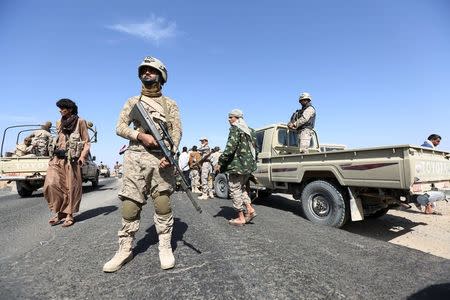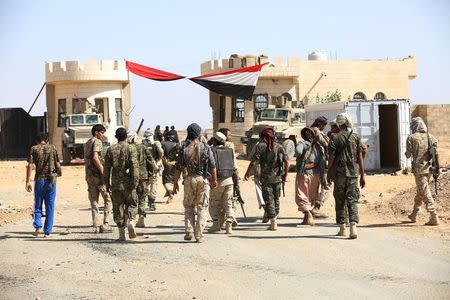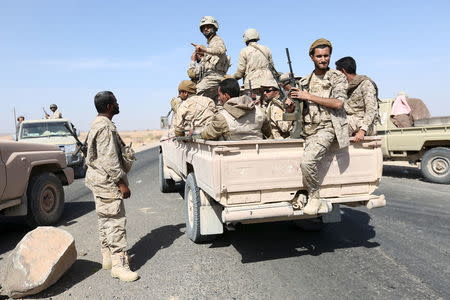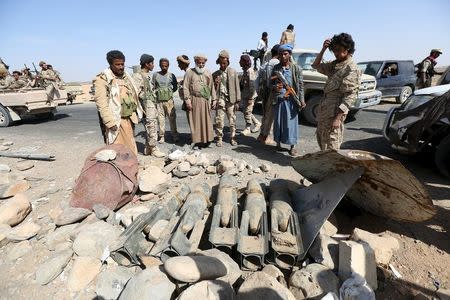Yemen govt forces take northwestern city, U.N. concern at truce violations
DUBAI/GENEVA (Reuters) - Yemeni troops loyal to President Abd-Rabbu Mansour Hadi gained control of an important northwestern city on Friday, residents and tribal sources said, as the U.N. scurried to salvage an increasingly fragile ceasefire. U.N. Special Envoy Ismail Ould Cheikh Ahmed voiced deep concern late on Friday, the fourth day of peace talks, at "numerous reports of violations of the cessation of hostilities" and set up a mechanism to strengthen compliance, a U.N. statement said. The heads of delegations at the talks being held in Switzerland between the exiled Yemeni government and Iran-backed Houthi rebels had renewed their commitment to a ceasefire that took effect on Tuesday, it said. "He urges all parties to respect this agreement and allow unhindered access for the delivery of humanitarian assistance to the most affected districts of Yemen," the statement said. Talks would continue on Saturday to "build on what was agreed upon in previous days and continue efforts to find an urgent political resolution to the crisis in Yemen", it added. The seven-day truce was declared to aid the chances of success of peace talks, in an effort to end the civil war that erupted in Yemen last year. Al-Hazm, capital of the northwestern al-Jawf province, had been under the control of the dominant Houthi group until the pro-Hadi forces captured it after two days of fighting. The sources said the Hadi loyalist troops had also gained control of al-Labnat military base near al-Hazm, which had been under the control of the Houthi militia and their allies, fighters loyal to former President Ali Abdallah Saleh. The impoverished country was plunged into war when the Houthis seized the capital Sanaa and marched south, triggering a Saudi-led military intervention in March. Saudi state news agency SPA cited the Saudi-led coalition of mainly Gulf Arab states as saying two missiles had been fired from Yemen towards Saudi Arabia in the latest fighting. The coalition said the first was repelled and fell inside Yemeni territory near Marib and the other fell in a desert area east of the Saudi city of Najran. "The leadership of the coalition asserts that while it is committed to the success of the negotiations in Geneva ... it will not abide by the ceasefire for long in the shadow of this threat to the kingdom's territory," SPA said. Each side has accused the other of repeated violations of the truce, which was supposed to begin on Tuesday. The U.N.-sponsored peace talks opened away from television cameras on Tuesday in the hope of ending nearly nine months of conflict that have killed almost 6,000 people and displaced millions. Sources close to the talks said direct talks between Hadi's government and the Houthi group had been suspended since Wednesday evening, after the Houthis rejected demands for the release of detained senior officials, including Defence Minister Mahmoud al-Subaihi and Hadi's brother Nasser. The sources say the U.N. mediator has however been meeting separately with the delegations. Mohammed Abdelsalam, the head of the Houthi delegation, said that the group had not boycotted any session of talks on Friday but had given the United Nations a letter detailing "violations" of the ceasefire. Those included, Abdelsalam said, "air strikes, military spread and expansion into Jawf and Marib", according to the Houthi-run Sabanews agency. Sabanews cited him as "affirming the continuation of consultative sessions in order to consolidate the ceasefire." On Thursday, Ould Cheikh Ahmed said the third day of peace talks had produced "a major step forward" on the humanitarian front - agreement on aid for the war-torn city of Taiz - that would pave the way to further agreements on aid and other issues in coming days. Medical sources said on Friday that limited medical aid had reached a few Houthi-controlled districts in Taiz. (Reporting by Mohammed Ghobari, additional reporting by Stephanie Nebehay in Geneva and Omar Fahmy in Cairo; writing by Yara Bayoumy, editing by Andrew Roche and Chris Reese)





